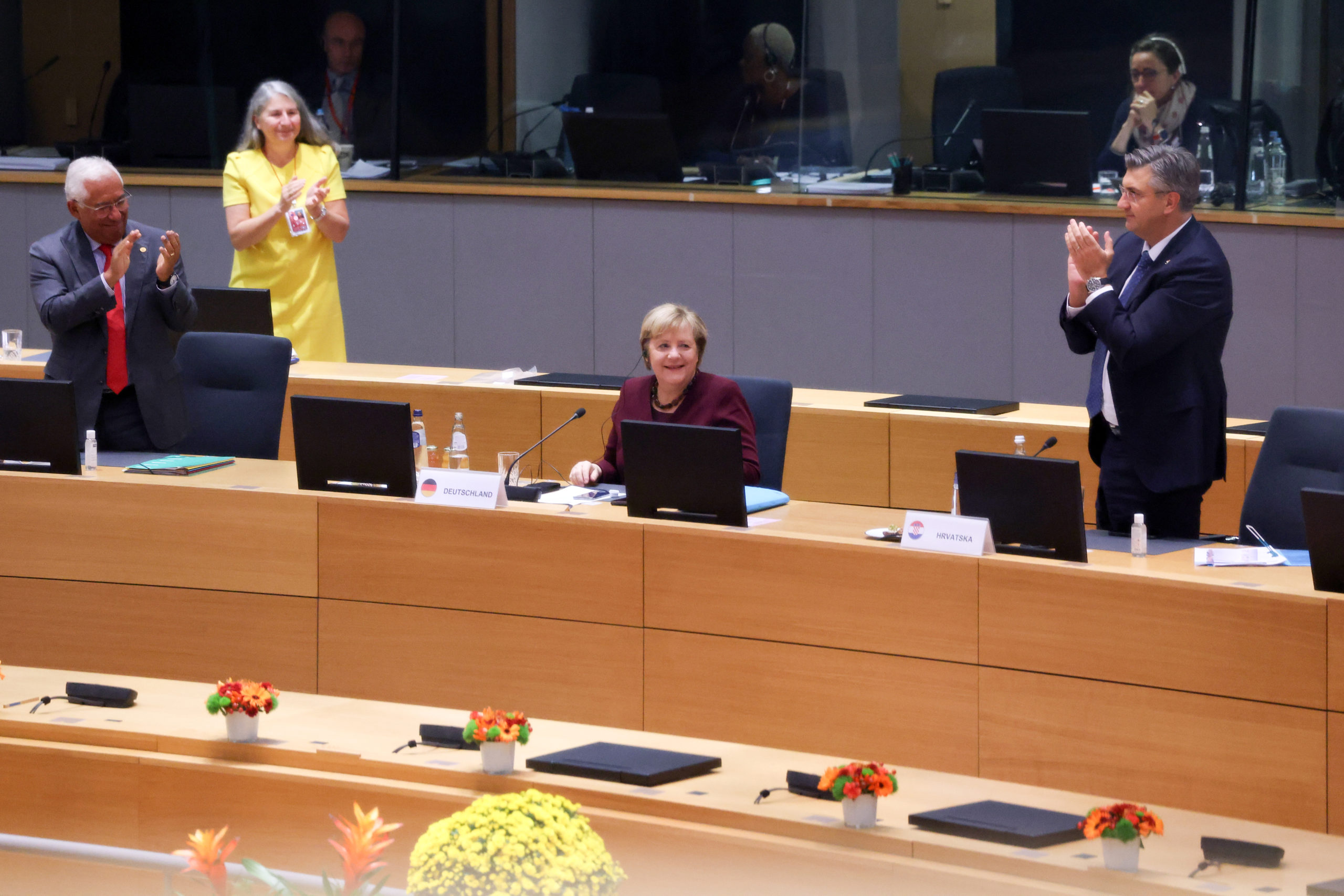Andrew Duff
As valedictions go, it was a curious affair. German Chancellor Angela Merkel might be forgiven for expecting more from her 107th and last meeting of the European Council (21-22 October). There was no breakthrough on any of the main items of business.
In a four-hour debate on how to deal with the spike in energy prices the division between those who trust in market correction and those who believe the market has failed was wide open. Because Article 194 TFEU leaves the choice of energy supply to member states, the EU’s competence to offer solutions is very limited. The best Commission President von der Leyen could offer was pooled purchasing of oil and gas for those states who want it, such as Poland and Spain. To placate the Czechs, the Commission will produce yet another report on the working of the ETS carbon emission trading scheme. The forthcoming proposal on energy taxonomy promises to face a further storm of protest from the anti-nuclear states.
On irregular immigration, von der Leyen stuck to her refusal to bow to demands from Eastern frontier states and Austria to use the EU budget to pay for fortifications. No progress was made in advancing consensus on the Commission’s plans to share responsibility for migrants among member states. The Schengen area remains in jeopardy.
After a vexed discussion about the future of the Union’s international trade negotiations, President Charles Michel could find nothing of substance to record. But at least the formal conclusions of the meeting report that the European Council “held a strategic discussion on EU trade policy”. This was not the case with what became the principal quarrel of Merkel’s last outing: a two-hour discussion on the rule of law receives no mention at all in the final communiqué.
Poland’s prime minister Mateusz Morawiecki was cajoled to retreat from his assaults on the primacy of EU law, but he did not do so. For Germany and the older member states, such obduracy goes to the heart of the matter and raises fears that Poland is about to follow the United Kingdom, by accident or design, out of the Union. It also calls into question the receipt by Poland of its dues under the Rapid Recovery Fund, €24 billion of which is supposed to be in the form of grants. Nothing will be resolved one way or the other until the European Court of Justice opines on the objections of Poland and Hungary to the rule of law conditionality mechanism which is intended to prevent the abuse of EU expenditure. Watch this space.
Treaty change
Angela Merkel pointed out, quite rightly, that litigation and threats were no way to resolve these divisions which stem from fundamental disagreements about the federal character of the Union. She will recall with pain the concessions she made in 2016 to David Cameron when he wanted, and got, a British opt-out from the goal of “ever closer union”. Poland and Hungary have stolen a leaf from the Brexiteers and now pose an existential threat to the judicial authority of the European Court of Justice. Without confirmation of the primacy of EU law there can be no further move to political integration.
Optimistically, Merkel said that issues of competences concerning migration and the rule of law could now be offered up for resolution to the Conference on the Future of Europe. In saying this, she implied she is ready again for treaty change — an adventure to which she has been firmly opposed since the signing of the Treaty of Lisbon (largely under her auspices) in 2007. Although the Conference is at last under way, it is highly unlikely that it will result in concrete proposals for treaty revision. Merkel’s words will echo, however, not least with Emmanuel Macron if he is re-elected as France’s president next year. Some echo, some l’esprit de l’escalier.
In the absence of formal conclusions of the European Council, it was left to Ursula von der Leyen to highlight the issue to the press:
“We had an important discussion, not only on the rule of law but also on the judicial independence. And I welcome that we had that discussion. The rule of law is at the heart of our Union. We all have a stake in this crucial issue because we know that the rule of law ensures mutual trust; it gives legal certainty throughout the European Union; and it gives equality between Member States and for each and every citizen of the European Union. A fundamental pillar of the rule of law is the judicial independence.”
For Merkel her last meeting must have been poignant. She, who for years has prioritised unity among member states over reform of the Union, leaves the Union more disunited than ever on fundamental concepts of European integration. “We have a whole series of unresolved problems”, she admitted, “and a lot of unfulfilled business for my successor. We have an unbelievable amount to do.”
No doubt historians will judge Merkel’s record as a European leader with respect as they plot her calm dedication to the cause of unity and the sixteen years she spent at sleep deprived meetings of the European Council. They will focus on the central part she played during the financial crash in 2008 and the refugee crisis from 2015. But as history may commend her honourable service to Europe, it should not neglect her admission at retirement that there was still “an unbelievable amount to do”.
Andrew Duff’s new book, ‘Britain and the Puzzle of European Union’, has just been published by Routledge.
The views expressed in this blog reflect the position of the author(s) and not necessarily that of the Brexit Institute Blog.
Photo credit: European Union, 2021



